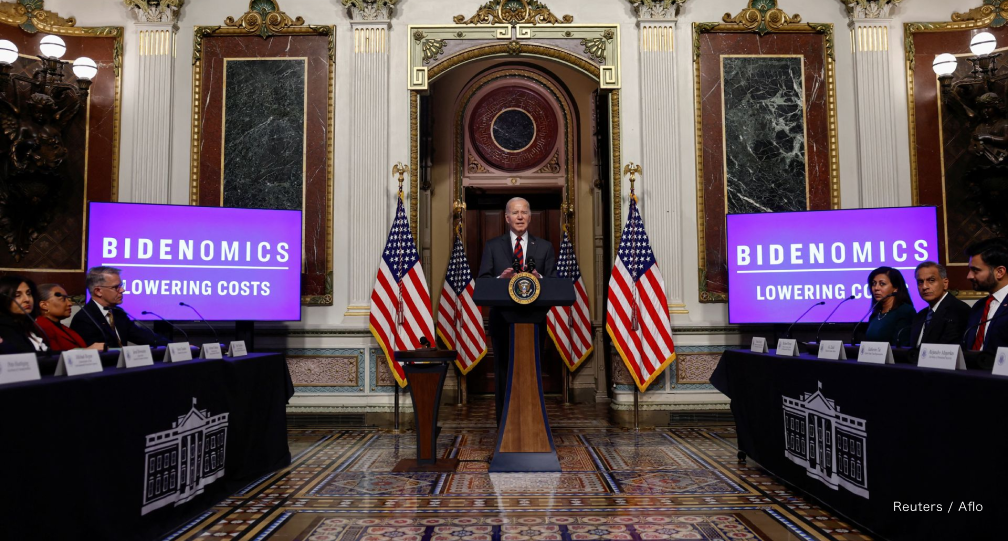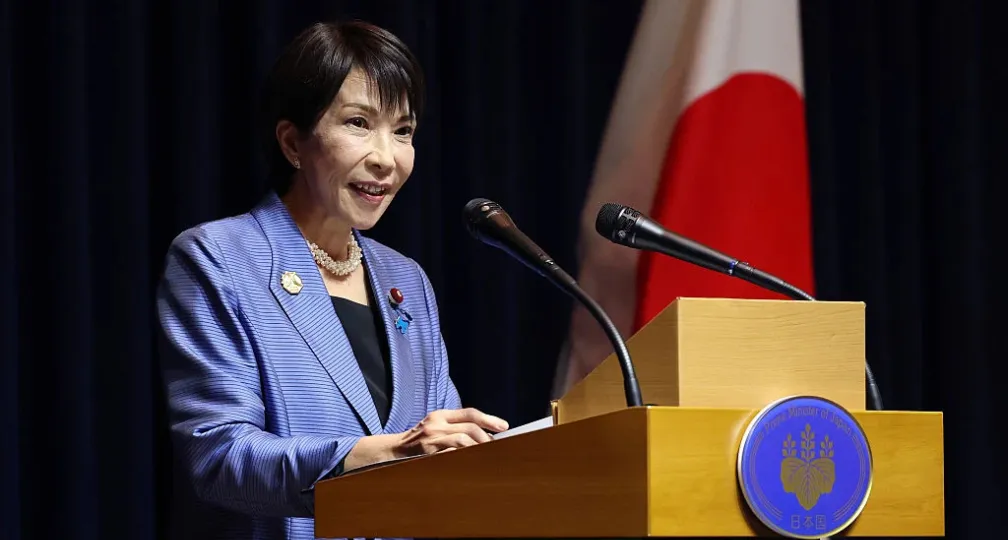Does economic security undermine the benefits of interdependence?

While economic security may be getting more attention, the areas of concern are not new for the U.S. What is new is increasing reliance on controls and coercion, rather than an open, rules-based trading system.
Interdependence as security
Discussions on whether the liberal order is to blame for economic interdependence and the vulnerabilities it creates miss the fact that this system was originally designed in the postwar era as a security strategy.
The belief was that economic harmonization among states would lead to their alignment on security issues, and trade became a tool for broader foreign policy goals.
The principles of reciprocity, removal of economic barriers and economic interdependence were seen as foundational elements of international peace. These basic principles later informed the “Washington Consensus” that called for the free movement of goods and capital. Governments deferred to the private sector and markets, while innovation allowed goods and finance to move more quickly and affordably than ever before.
This extended beyond the end of the Cold War, as economic liberalization in the former Soviet bloc was seen as the best way to “win the peace.”
Vulnerabilities emerge
However, beyond the immediate peace dividend, in the U.S., the broader foreign policy rationale for open trade diminished after the collapse of the Soviet Union.
Over time, Washington has shifted its approach for three reasons: A greater awareness of the risks of interdependence, the growing weaponization of China’s economy under its leader Xi Jinping and a divided political landscape that leaves coercion as an attractive option for American presidents.
As a result, economic security has evolved from harmonizing interests to prioritizing national security. In practice, the biggest change is how interdependence has provided a platform for economic coercion and supply chain disruptions.
“Ignoring economic dependencies that had built up over the decades of liberalization had become really perilous,” U.S. National Security Advisor Jake Sullivan said in April last year. “These were the kinds of dependencies that could be exploited for economic or geopolitical leverage.”
These comments reveal that the Biden administration views interdependence as presenting greater challenges than discrete issues like supply chain disruptions or China’s economic coercion. At the same time, interdependence is fundamental to an open, connected system and framing it as a security challenge turns the logic of the postwar order on its head.
It is no accident that China emerges so prominently among these concerns, as it may have been the system’s biggest bet on its own success.
In the 1990s, as liberalization swept across the former Soviet bloc, it made sense to extend this agenda to the world’s most populous country, not least of all because of the Chinese leadership’s eagerness to embrace it.
Saying that this was a bad bet would be going too far, but it was oversold and the results have not been as hoped. Commerce with China has undermined public confidence in free trade and Beijing is heading in a more authoritarian, rather than a more liberal, direction.
China was an early mover in linking economics and security through the language of “integration of development and security.” As long as China continues along these lines, there will always be a large contingent in Washington that insists on doing the same.
Finally, the less obvious — but perhaps most critical — reason for America’s focus on economic security is that it has become the easiest policy space in which a divided Washington can act.
Trade liberalization is off the table almost entirely because new agreements are too politically risky for Democrats, while Republicans are only interested insofar as Donald Trump makes such agreements a priority.
At the multilateral level, the World Trade Organization has stalled and there is little reason to think that renewed American initiative alone would breathe new life into the trade regime.
With bilateral agreements unlikely and multilateral ones unrealistic, economic security is one of the only ways for American administrations to exercise an international economic policy. Presidential authority, from export controls to investment reviews, does not require formal input from Congress, leaving the executive close to a free hand.
A role for interdependence?
The challenge going forward will be reconciling economic security with free-market principles.
While there are many important critiques of the postwar economic order, it still produced the greatest reduction in poverty and increase in welfare in world history. And it is fair to ask if those gains can be expanded even as efforts to minimize the risks of interdependence increase.
To be sure, U.S. economic security policy has become smarter and more sophisticated. The relevant departments and agencies are staffed with experts who understand these issues well, and there seems to be a process for learning and improving.
At the same time, an overreliance on coercion and hope that targets understand the signals behind each move is a risky bet without much to fall back on.
Japan and other Indo-Pacific partners have a different approach. They are trying to balance protecting themselves from supply-chain disruptions while preserving the economic benefits of integration. However, using an outdated approach runs the risk of achieving neither.
This approach — which the Biden administration has relied on to limit investment in China and restrict the sale of advanced technologies to it — was designed for an era when there was more consensus on the main challenger to U.S. primacy and when the private sector played a far less important role in global governance.
Washington seemingly understands this, but not in a good way. Daniel Drezner of the Fletcher School at Tufts University in Massachusetts writes that he hears “phrases like, ‘we’re all trying to figure this out in real time’ and ‘we’re building the plane as we’re flying it’” when talking to officials.
For example, the U.S. and other governments know little about how supply chains work or are built. A new European Union law obliges firms to have a better grasp of their supply chains and American legislation such as the CHIPS and Science Act and Inflation Reduction Act provide incentives for firms to relocate suppliers in more secure ways.
However, supply chains are private-sector strategies motivated by private-sector priorities, which are not necessarily the same as governments’. By the same token, “friend-shoring” — a strategy to build resiliency into supply chains by relocating them to allied countries — is not being buttressed in the U.S. by free trade agreements to incentivize firms to relocate operations or encourage target countries to improve their business environment.
At this point, U.S. economic security strategy is at cross-purposes with the idea behind the rules-based order, which is to build global security by ensuring economic welfare and giving countries a material incentive to buy in.
The size of the American economy, its leadership in innovation and its position as an international financial hub will continue to give it a decisive role in shaping economic security rules. And countries will continue to follow its lead, to an extent.
If U.S. decision-makers want to mitigate the risks of interdependence, they also need to think about how to preserve its benefits — or else other countries will start looking elsewhere.
[Note] This article was posted to the Japan Times on June 9, 2024:
https://www.japantimes.co.jp/commentary/2024/06/09/world/economic-security-us-interdependence/

Geoeconomic Briefing
Geoeconomic Briefing is a series featuring researchers at the IOG focused on Japan’s challenges in that field. It also provides analyses of the state of the world and trade risks, as well as technological and industrial structures (Editor-in-chief: Dr. Kazuto Suzuki, Director, Institute of Geoeconomics (IOG); Professor, The University of Tokyo).
Disclaimer: The opinions expressed in Geoeconomic Briefing do not necessarily reflect those of the International House of Japan, Asia Pacific Initiative (API), the Institute of Geoeconomics (IOG) or any other organizations to which the author belongs.


Visiting Research Fellow
Paul Nadeau is an adjunct assistant professor at Temple University's Japan campus, co-founder & editor of Tokyo Review, and an adjunct fellow with the Scholl Chair in International Business at the Center for Strategic and International Studies (CSIS). He was previously a private secretary with the Japanese Diet and as a member of the foreign affairs and trade staff of Senator Olympia Snowe. He holds a B.A. from the George Washington University, an M.A. in law and diplomacy from the Fletcher School at Tufts University, and a PhD from the University of Tokyo's Graduate School of Public Policy. His research focuses on the intersection of domestic and international politics, with specific focuses on political partisanship and international trade policy. His commentary has appeared on BBC News, New York Times, Nikkei Asian Review, Japan Times, and more.
View Profile-
 Fed-Treasury Coordination as Economic Security Policy2026.02.13
Fed-Treasury Coordination as Economic Security Policy2026.02.13 -
 What Takaichi’s Snap Election Landslide Means for Japan’s Defense and Fiscal Policy2026.02.13
What Takaichi’s Snap Election Landslide Means for Japan’s Defense and Fiscal Policy2026.02.13 -
 Challenges for Japan During the U.S.-China ‘Truce’2026.02.12
Challenges for Japan During the U.S.-China ‘Truce’2026.02.12 -
 India and EU Sign Mother of All Deals2026.02.09
India and EU Sign Mother of All Deals2026.02.09 -
 Orbán in the Public Eye: Anti-Ukraine Argument for Delegitimising Brussels2026.02.04
Orbán in the Public Eye: Anti-Ukraine Argument for Delegitimising Brussels2026.02.04
 Orbán in the Public Eye: Anti-Ukraine Argument for Delegitimising Brussels2026.02.04
Orbán in the Public Eye: Anti-Ukraine Argument for Delegitimising Brussels2026.02.04 Fed-Treasury Coordination as Economic Security Policy2026.02.13
Fed-Treasury Coordination as Economic Security Policy2026.02.13 When Is a Tariff Threat Not a Tariff Threat?2026.01.29
When Is a Tariff Threat Not a Tariff Threat?2026.01.29 Oil, Debt, and Dollars: The Geoeconomics of Venezuela2026.01.07
Oil, Debt, and Dollars: The Geoeconomics of Venezuela2026.01.07 India and EU Sign Mother of All Deals2026.02.09
India and EU Sign Mother of All Deals2026.02.09














